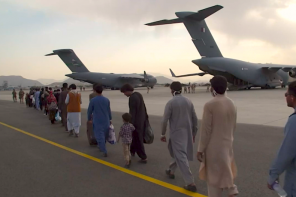Much too little, much too late. That’s the problem with Obama’s options in Syria—but many are of his own making. President Obama tried to split the difference over Afghanistan, neither the minimalist nor the maximalist option; this Goldilocks approach to foreign policy continues on his response to President Bashar al-Assad’s most recent alleged use of chemical weapons.
And in this conflict, where would President Obama have us stand? In two places at once—it is like the President is negotiating with himself while he is negotiating with his allies while he is threatening our purported enemies. Which has been, as you can predict, a terrible policy. The worst thing you can do besides fighting a war that does not need to be fought—going to war in Iraq is an outstanding example—is to half-ass the fight.
War is not a bazaar negotiation, because in bazaars one should not be trading in lives. One does not “split the strategic difference”; either you get in, strategically and determinedly, or you do not go in at all; if the conflict is not amenable to intervention, or the American people are not, or you decide the possible costs are too high, then do not get involved. What has been the advantage to arming the rebels, but just enough that the killing keeps going on?
More than a few people in the Middle East will interpret our waffling as murderously cynical; others may be inclined to see this as terribly incompetent. Neither does much for America’s standing in the world, which is ostensibly the concern the Obama administration has in preserving a ‘red line’ around chemical weapons. (Kill all the civilians you want, of course.)
Air strikes accelerate America’s involvement in this war without giving the American people, or the region affected, any sense of what the long-term strategy is. Americans are within their rights to reject such muddled, cloudy policy, which seeks to increase our involvement without clarifying why we should be involved, to what ends, and how we will respond to other countries’ responses to us. Already, the UK has broken off from the alliance; this is not an automatic indicator of Western decline so much as it is, perhaps, an indicator of the bad taste Iraq left in everyone’s mouth.
Should we go to war in Syria? is not the question we should be asking ourselves right now. Because it’s been answered. We actually are at war; we directly provide aid and assistance to the rebels—though of what kind and in what frequency are disputed—and through our allies we provide aid and assistance. Where former President George W. Bush offered shock and awe, President Obama offers the hem and haw. War, but not a serious one; aid, but of the “non-lethal kind”; a desire to draw red lines, but a tendency to hope nobody notices them.
Let’s be honest with ourselves. We’re at war with Assad’s government, which means we are indirectly at war with Hezbollah and Iran, which means we are however unintentionally on the same side as al-Qaeda in that conflict. So we have not committed to overthrowing Assad, because we’re not sure if we like the Middle East better with or without him, and so we begin to reproduce a very bad and very dark romantic comedy. By proposing that we slap Assad on the wrist with a few days of air strikes, we are only continuing a pattern of embarrassing indecision.
If the primary reason we are pursuing air strikes to war is because Obama drew a red line in the sand, then the fact is we look even worse than before if we issue an airborne slap on the wrist and Syria continues to drag on, with more massacres and murders (just not of the gaseous kind). Such an outcome, which is predictable and expectable, only continues this horrible war, complicates our relationship with key actors in the region, threatens to destabilize Turkey—the only major power we have an alliance with in the region that has any regional clout—and perhaps leaves the door open to future involvement.
This policy of not having a policy, of trying to enter the room while keeping it propped open with your back foot, is a disaster. Either we take out Bashar Assad, and use the threat of decisive force to get Russia and Iran to join a discussion, on a future Syria without the Assads or we don’t. (Meanwhile, rebel forces who refuse to come to the table will be told in no uncertain terms that they won’t be part of the order.) Splitting the difference is not the great response the masses of the Arab world deserve to hear in response to their uprisings. Indeed, since the Arab Spring began, we’ve offered tepid encouragement and uncertain commitment; mostly we’ve been reduced to a bystander.
How can it be that Russia and Iran and France have clearer positions than we do? Have these countries become more powerful than us? Yes, America’s proportionate influence in the world has fallen, but not enough to explain away what can be laid at the President’s door. A failure of leadership and an inability to provide vision and the courage to get out ahead of the Arab Spring in order to change America’s role in the Middle East and the Muslim world. Passing the buck to Congress only underlines my point. People are dying because we refuse to make up our mind.




